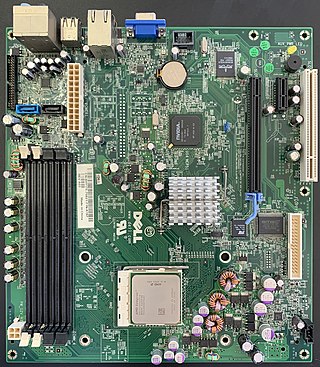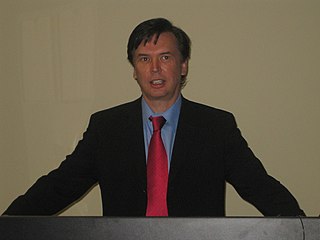
Computer engineering is a branch of computer science and electronic engineering that integrates several fields of computer science and electronic engineering required to develop computer hardware and software. Computer engineering is referred to as computer science and engineering at some universities.
A biomedical engineering/equipment technician/technologist or biomedical engineering/equipment specialist is typically an electro-mechanical technician or technologist who ensures that medical equipment is well-maintained, properly configured, and safely functional. In healthcare environments, BMETs often work with or officiate as a biomedical and/or clinical engineer, since the career field has no legal distinction between engineers and engineering technicians/technologists.
The National Institute for Certification in Engineering Technologies (NICET) is an organization that was established in 1961 to create a recognized certification for engineering technicians and technologists within the United States. A 1981 study by the National Cooperative Highway Research Program (NCHRP), requested by the American Association of State Highway and Transportation Officials' SubCommittee On Construction (AASHTO SCOC), prompted the National Society of Professional Engineers (NSPE) to merge two certification bodies; the Institute for the Certification of Engineering Technicians (ICET) and the Engineering Technologist Certification Institute. The result is a nonprofit organization that provides a nationally recognized and accepted procedure for recognition of qualified engineering technicians and technologists.

An engineering technician is a professional trained in skills and techniques related to a specific branch of technology, with a practical understanding of the relevant engineering concepts. Engineering technicians often assist in projects relating to research and development, or focus on post-development activities like implementation or operation.

Electrical/Electronics engineering technology (EET) is an engineering technology field that implements and applies the principles of electrical engineering. Like electrical engineering, EET deals with the "design, application, installation, manufacturing, operation or maintenance of electrical/electronic(s) systems." However, EET is a specialized discipline that has more focus on application, theory, and applied design, and implementation, while electrical engineering may focus more of a generalized emphasis on theory and conceptual design. Electrical/Electronic engineering technology is the largest branch of engineering technology and includes a diverse range of sub-disciplines, such as applied design, electronics, embedded systems, control systems, instrumentation, telecommunications, and power systems.
Industrial training institutes (ITI) and industrial training centers (ITC) is a qualification and are post-secondary schools in India constituted under the Directorate General of Training (DGT), Ministry of Skill Development and Entrepreneurship, Union Government, to provide training in various trades.

Illinois Technical College was a small private junior college that specialized in teaching electronics theory and repair. The college was located in the Loop area of downtown Chicago, Illinois, United States, on Wabash Avenue. The college is no longer in operation, having closed in 1992. Records from the school are held by the Illinois State Board of Education.

The College of Engineering Perumon was started in 2000 under the Co-operative Academy of Professional Education Society. The society was formed to establish educational institutions to provide education and training, research and development, and consultancy. The society is promoted by the Co-operation Department of the government of Kerala and is an autonomous society.

Colin Simpson is a Canadian entrepreneur, software developer, and the author of seven textbooks, including the bestseller Principles of Electronics. With over 500,000 of his textbooks in print, Dr. Simpson is considered as an expert in the teaching of electronics and electronics simulation technology. He has won numerous awards including the Award of Excellence from the Association of Canadian Community Colleges (ACCC), the TVOntario Lifelong Learning Challenge Award, and the Codie award from the Software Publishers Association. Simpson holds two patents in electronics laboratory simulation and control systems technology, and is recognized as an authority on distance education and the integration of laboratory simulation software. He has been interviewed by the CBC, PBS, CTV, TVOntario, The Globe and Mail, Toronto Star, Chicago Tribune, and has lectured at universities around the world. Simpson has a Ph.D. in Electrical Engineering from the University of Hawaii and a Doctorate of Letters from Nipissing University.
The U.S. Army Prime Power School is run by the United States Army Corps of Engineers at Fort Leonard Wood, Missouri since January 2011, having previously moved from Fort Belvoir, Virginia. The mission of the school is to produce MOS 12P – Prime Power Production Specialists for the U.S. Army.

The Diploma in Engineering, Diploma in Technology, Diploma in Technical Education is a program focused on practical and skills-oriented training in India. It is a technical course that only covers the essentials when ranked with an undergraduate engineering degree. It aims to provide students with industry or job related basic engineering knowledge, scientific skills, computing and analysis, mathematical techniques, a sound knowledge of English to communicate in the field and the ability to apply problem-solving techniques.

Marine Corps Communication-Electronics School (MCCES) is the Marine Corps training ground for the majority of the communications and air/ground electronic maintenance Military Occupational Specialties (MOS). MCCES is based at the Marine Corps Air Ground Combat Center Twentynine Palms, California.

A drafter is an engineering technician who makes detailed technical drawings or plans for machinery, buildings, electronics, infrastructure, sections, etc. Drafters use computer software and manual sketches to convert the designs, plans, and layouts of engineers and architects into a set of technical drawings. Drafters operate as the supporting developers and sketch engineering designs and drawings from preliminary design concepts.

The Government Engineering College, Barton Hill, Thiruvananthapuram, was founded by the Government of Kerala in August 1999 and provides technical education under APJ Abdul Kalam Technological University. The institution is located in Barton Hill, which is two kilometres (1.2 mi) from the city centre in Trivandrum.

The United States Navy job rating of electronics technician (ET) is a designation given by the Bureau of Naval Personnel (BUPERS) to enlisted members who satisfactorily complete initial Electronics Technician "A" school training.
The Electronics Training Program (ETP) was the name commonly used for an unusual, difficult, and selective training activity of the United States Navy during World War II.

The Mohajer Technical University of Isfahan (Persian: دانشکده فنی مهاجر اصفهان, is one of the higher education centers in Isfahan, Iran. The University was previously known as the Isfahan Institute of Technology and was renamed Mohajer Technical University after the 1979 Iranian Revolution. It is an independent and separated unit of the University of Isfahan, located south of the main campus and occupying 84,000 cubic meters on Hezar Jarib Boulevard. It was the first significant professional higher education center in technical major academic fields in Isfahan and consists almost entirely of industrial fields of study. Today Mohajer provides associate degrees in sixteen fields of study and bachelor's degrees in six.

Automation technicians repair and maintain the computer-controlled systems and robotic devices used within industrial and commercial facilities to reduce human intervention and maximize efficiency. Their duties require knowledge of electronics, mechanics and computers. Automation technicians perform routine diagnostic checks on automated systems, monitor automated systems, isolate problems and perform repairs. If a problem occurs, the technician needs to be able to troubleshoot the issue and determine if the problem is mechanical, electrical or from the computer systems controlling the process. Once the issue has been diagnosed, the technician must repair or replace any necessary components, such as a sensor or electrical wiring. In addition to troubleshooting, Automation technicians design and service control systems ranging from electromechanical devices and systems to high-speed robotics and programmable logic controllers (PLCs). These types of systems include robotic assembly devices, conveyors, batch mixers, electrical distribution systems, and building automation systems. These machines and systems are often found within industrial and manufacturing plants, such as food processing facilities. Alternate job titles include field technician, bench technician, robotics technician, PLC technician, production support technician and maintenance technician.
PLC technicians design, program, repair, and maintain programmable logic controller (PLC) systems used within manufacturing and service industries ranging from industrial packaging to commercial car washes and traffic lights.













